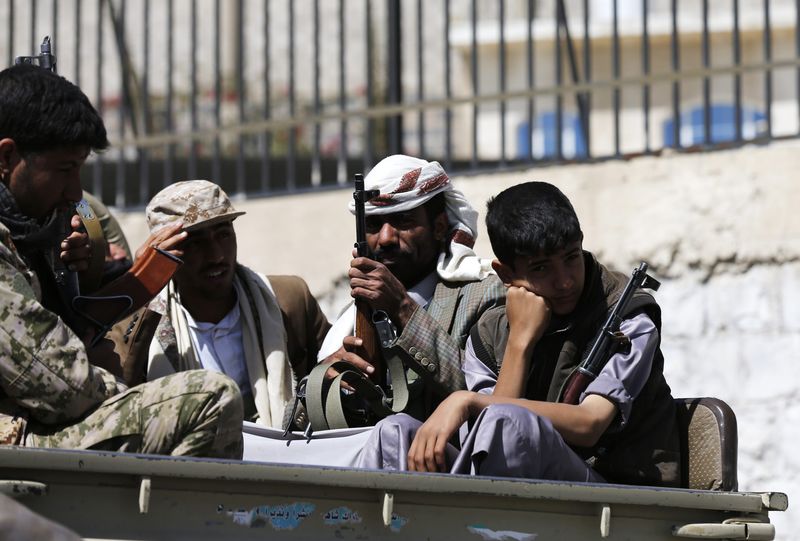By Yara Bayoumy and Mohammed Ghobari
SANAA (Reuters) - Fighters from the Houthi group battled guards at the Yemeni president's private home and entered the presidential palace on Tuesday, witnesses said, as a second day of violence in Sanaa raised fears the country was descending into chaos.
In a speech on live television, Houthi leader Abdel-Malek al-Houthi suggested two days of fighting involving his men were part of an attempt to protect a power-sharing deal meant to steer Yemen to stability.
His speech was critical of President Abd-Rabbu Mansour Hadi, a U.S. ally with whom Houthi has been at odds over a draft constitution intended to help end decades of conflict and underdevelopment.
He said no one, including Hadi, was above any steps when it came to implementing the power-sharing accord, which was negotiated after his men seized Yemen's capital, Sanaa, in September. Houthi prizes the accord as it grants his group participation in all military and civil state bodies.
"We ... will not hesitate to impose any necessary measures to implement the peace and partnership agreement," said Houthi, whose Shi'ite Muslim group is widely seen as an ally of Iran in its regional struggle for influence with Saudi Arabia.
U.N. Secretary-General Ban Ki-moon has condemned the violence and called for order in the country.
The United States remains "firmly committed" to supporting Hadi and his government and is calling for an "immediate cessation of hostilities," a State Department official said.
TENSIONS
Other U.S. officials in Washington, who spoke on condition of anonymity, said they were not sure of Hadi's status or whether he was in either of the buildings under Houthi assault.
They said their latest information from Sanaa indicated Houthi rebels were surrounding Hadi's private residence and were in control, or close to taking control, of his official residence.
The emergence of the Houthis as Yemen's top power in September has scrambled alliances and stoked tensions across Yemen's political spectrum, raising fears of deeper instability in a country that has one of al Qaeda's most active branches.
The U.S. officials said Iran was backing the Houthi rebellion with financial and political support. Some officials said shipments of weapons from Iran to the Yemeni Houthis had been tracked by foreign governments.
Washington has been concerned about the turmoil in part because it relies on the Yemeni government for help in counterterrorism operations against al Qaeda in the Arabian Peninsula (AQAP), which claimed responsibility for the Jan. 7 attacks in Paris.
Yemeni Information Minister Nadia al-Saqqaf said the clashes at Hadi's residence amounted to an attempt to topple Yemen's government, a charge denied by a senior official of the Houthi group.
The clashes followed some of the worst fighting in Sanaa in years on Monday. Guards loyal to Hadi fought artillery battles near the presidential palace with the Houthi, which has been in conflict with Hadi over political and constitutional issues.
"Yemeni president under attack by armed militias seeking the overthrow of the ruling system," Saqqaf said on Twitter on Tuesday evening.
Residents said later the fighting had died down. A government official said two people had been killed.
The minister did not identify the militias, but she said they were firing from nearby houses. Hadi lives in his private home and not in the palace.
NOT TARGETING HADI
Mohammed al-Bukhaiti, a member of the Houthi politburo, said his group had no plans to target Hadi.
"Ansarullah has no intention of targeting President Hadi or his house," Mohammed al-Bukhaiti, a member of the group's politburo, told Reuters, using the group's official name.
He said what happened at Hadi's house was the result of a "provocation" by Hadi's security and that the incident has been contained.
Earlier on Tuesday, Houthi fighters had entered Yemen's presidential palace after a brief clash with security guards, witnesses and security sources told Reuters.
Bukhaiti said the Popular Committees acted at the presidential palace on request from officers who had asked them to help stop a local officer from stealing weapons from the compound.
Washington has made clear that it sees chaos in Yemen as creating conditions that al Qaeda can exploit to strengthen its support and let it use the country for plotting attacks on Western interests.

Even amid the growing turmoil of recent months, U.S. policy makers have praised Yemen's government for its collaboration on counterterrorism for supporting U.S. drone strikes and special forces operations against militants.